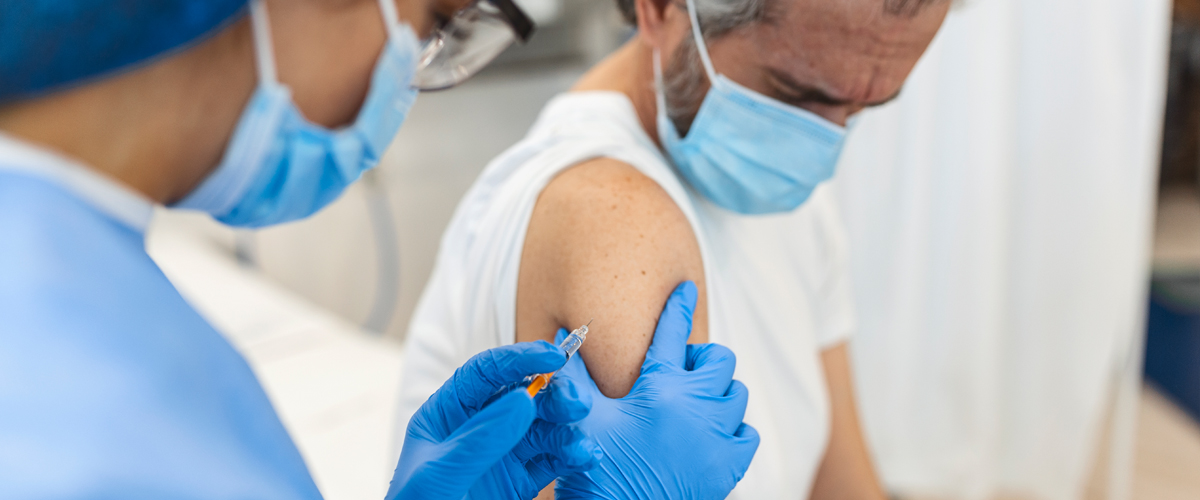What to Know About the Additional COVID-19 Shots for the Immunocompromised
An infectious disease expert explains the recent guidance encouraging a third dose of the COVID-19 vaccine for individuals with moderately to severely weakened immune systems.

With concerns that individuals who are immunocompromised are more at risk for serious, prolonged COVID-19 illness, the U.S. Food and Drug Administration (FDA) and Centers for Disease Control and Prevention (CDC) approved a third dose of the COVID-19 vaccine for people who have moderately to severely weakened immune systems.
According to the CDC, this population includes people who have:
- Been receiving active cancer treatment for tumors or cancers of the blood
- Received an organ transplant and are taking medicine to suppress the immune system
- Received a stem cell transplant within the last two years or are taking medicine to suppress the immune system
- Moderate or severe primary immunodeficiency (such as DiGeorge syndrome, Wiskott-Aldrich syndrome)
- Advanced or untreated HIV infection
- Active treatment with high-dose corticosteroids or other drugs that may suppress your immune response
“Individuals with compromised immune systems stand to benefit from this additional dose,” says Dr. Marcus R. Pereira, medical director of the Transplant Infectious Diseases Program at NewYork-Presbyterian/Columbia University Irving Medical Center and assistant clinical professor of medicine in the Division of Infectious Diseases at Columbia University Vagelos College of Physicians and Surgeons. “The CDC and FDA guidelines may change to include more patients in the coming weeks, so people should keep their antennas up.”

Dr. Marcus Pereira
Health Matters spoke with Dr. Pereira to understand who is currently eligible for an additional vaccine shot, why, and what we can expect in the near future.
Why did the FDA and CDC decide that immunocompromised individuals could use a third shot?
The background to this decision is that a number of studies in immunocompromised patients, including solid organ and stem cell transplant patients, and those with hematological malignancies and cancer, all consistently mounted a weaker immune response after the vaccine when compared to the general population.
In kidney transplant recipients, for example, a study performed here at NewYork-Presbyterian/Columbia University Irving Medical Center showed that only about 40% of patients formed antibodies after full COVID vaccination, as compared to over 90% for the general population. Another study from Johns Hopkins looked at over 1,000 patients and saw the same results — these patients had low antibody formation. Studies in Germany and France all showed a very reduced response to the vaccine compared to the general population.
Throughout the spring, we were seeing lower rates of infections throughout the United States and not a lot of breakthrough infections. Unfortunately, with the Delta variant, that has changed. So that concern about the potential for breakthrough infections combined with a number of studies culminated in this newer recommendation of providing an additional dose to those immunocompromised patients who have been fully vaccinated.
Why do immunocompromised people benefit from an extra shot?
We have known historically from prior vaccines, including influenza and the pneumonia vaccines, that immunocompromised patients generally have a weaker response to vaccines. This is not unique to the COVID vaccines. The reason for that is because vaccines require a functioning immune system to work efficiently.
The vaccine is essentially a set of instructions to your immune system that say, “Here, recognize this signal. If you ever see it in the future, respond very fast to it. Learn from this injection.” For your body to learn from that injection and to carry out that set of instructions, you need a functioning immune system. But when transplant patients, for example, receive a vaccine, that response is much reduced, unfortunately. And we’ve known from research with influenza, pneumonia, and hepatitis B vaccines that additional doses are required to match or even come close to a vaccine response in someone who is not immunocompromised.
When your immune system is weak and not functioning as it should, this can lead to a greater risk of infection and illness. We need the production of antibodies (proteins that identify pathogens in the body) and T cells (white blood cells that work with antibodies) to identify and elicit an immune response to fight off infection. An additional dose of vaccine may improve immunocompromised people’s immune response and help further protect them from severe disease.
Who is eligible to receive a third dose?
Immunocompromised could be an incredibly broad category, and some people may not squarely fit in it. The ones who would be clearly included would be solid organ transplant recipients, stem cell transplant recipients, those actively being treated for a malignancy with chemotherapy, and patients who were born with a weaker immune system. Also, those with advanced or untreated HIV infection, including those with T cells less than 200, and patients who are taking high-dose corticosteroids, which is equivalent to about 20 milligrams of prednisone per day, or taking other agents for their autoimmune diseases.
Is there research on how the additional shot has performed for this population?
Yes, a number of studies show that third shots benefit people with a suppressed immune system. Studies from France, Israel, and Canada, among others, all showed that in solid organ transplant recipients, immune responses went from about 40% after the second dose to almost 70% after the third dose. This showed that immunocompromised people benefitted from getting additional doses of these vaccines.
At NewYork-Presbyterian/Columbia University Irving Medical Center, we are studying how the immunocompromised population responds to third doses and anticipate more studies to investigate vaccine responses.
An additional dose of vaccine may improve immunocompromised people’s immune response and help further protect them from severe disease.
Dr. Marcus Pereira
Which vaccines are recommended for the third dose?
At this time, the third dose has been authorized for mRNA vaccines only — so, the Pfizer and Moderna vaccines. The CDC’s recommendation is for patients to try to get the same vaccine that they received for the first two doses. That’s essentially based on the fact that most of the studies that have been published so far have done just that: given a third dose of the same vaccine.
However, if your original mRNA vaccine is not available, the CDC allows for patients to receive the other product. We know that it’s safe and it should be equally if not more effective.
What about immunocompromised people who got the Johnson & Johnson vaccine?
Currently, an additional dose is not recommended for those who are immunosuppressed and received a Johnson & Johnson COVID-19 vaccine. The CDC is waiting for more data, which should be here very shortly. As soon as the data supports giving additional doses for those patients who received the J&J vaccine, the CDC will issue new guidance.
Will a booster shot be recommended for the general population in the future?
U.S. health officials are already recommending booster shots for the general population as soon as September 20. As powerful as these vaccines are, the data show that their impact on the immune system wanes over time, whether it’s by antibody levels or the ability to deal with the newer variants. This suggests that most people would benefit from another “refresher course,” so to speak, from a vaccine so that the immune system is once again boosted and trained on SARS‑CoV‑2.
What should people do if they qualify for a third shot?
Speak with your health care provider about your medical condition and whether a third dose is needed. Even after three doses, I think that it’s very important for our immunocompromised population to still be very safe in their practices by wearing masks, practicing social distancing, and avoiding large crowds. The vaccine is an additional layer of protection — and an incredible one — but all these safety measures should still be used for the time being.
Additional Resources
Learn more about the COVID-19 vaccines.
Marcus R. Pereira, M.D., MPH, is medical director of the Transplant Infectious Diseases Program at NewYork-Presbyterian/Columbia University Irving Medical Center and an assistant clinical professor of medicine in the Division of Infectious Diseases at Columbia University Vagelos College of Physicians and Surgeons. Dr. Pereira is focused on infectious complications among patients with solid organ and bone marrow transplants as well as hematological malignancies and provides care in both inpatient and outpatient settings. As medical director of the Transplant Infectious Diseases Program, Dr. Pereira oversees the development of infection prophylaxis and treatment protocols for immunocompromised patients. His areas of interest include multi-drug resistant infections, including bacterial and fungal organisms in transplant patients as well as resistant cytomegalovirus (CMV) infections. He is an associate editor of the American Journal of Transplantation and has led several studies this past year on the impact of COVID-19 in solid organ transplant recipients.
